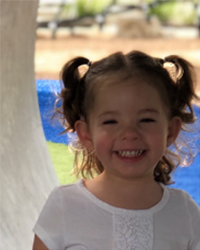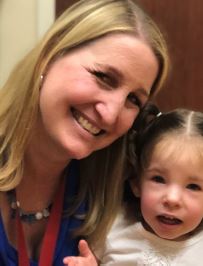 Domenica was born May 3rd, 2017. At a week old she returned to the hospital and was admitted to Morristown’s NICU. There they administered a video EEG to rule out seizures and search for the reason why she was not waking up or able to eat. During her two week stay she endured other tests including spinal tap, bloodwork, and genetics testing.
Domenica was born May 3rd, 2017. At a week old she returned to the hospital and was admitted to Morristown’s NICU. There they administered a video EEG to rule out seizures and search for the reason why she was not waking up or able to eat. During her two week stay she endured other tests including spinal tap, bloodwork, and genetics testing.
While there we met with neonatologists, geneticists, neurologists, GI doctors, therapists, nurses and counselors to find the cause for her low muscle tone and failure to thrive. Together we made a plan to support her back at home. Before leaving she underwent anesthesia and surgery to have a gastrostomy tube placed in her stomach to ensure she was getting proper nutrition while unable to eat on her own. We brought her home without any clear answers.
Once home, there were unending follow up appointments with doctors and Physical and Feeding therapy sessions started weekly. Our family tried to get a grasp of our new normal. At four weeks old we received the devastating confirmation from genetics testing that Domi has Prader-Willi Syndrome (PWS).
 PWS is a rare, lifelong condition which is caused by a malformation on the 15th chromosome. It is a multi-stage spectrum disorder and symptoms may include hypotonia, failure to thrive, developmental delays, learning disabilities, speech issues, short stature, behavioral and mental problems, cognitive impairment, sleep apnea, scoliosis, hormonal issues and hyperphagia. Hyperphagia is the hallmark symptom of PWS that is life threatening and causes those affected to be painfully hungry and never feel full.
PWS is a rare, lifelong condition which is caused by a malformation on the 15th chromosome. It is a multi-stage spectrum disorder and symptoms may include hypotonia, failure to thrive, developmental delays, learning disabilities, speech issues, short stature, behavioral and mental problems, cognitive impairment, sleep apnea, scoliosis, hormonal issues and hyperphagia. Hyperphagia is the hallmark symptom of PWS that is life threatening and causes those affected to be painfully hungry and never feel full.
There is not a cure for PWS and at this time there is only one drug that is approved for treatment. Human Growth Hormone (HGH) is given every night before bedtime by injection to help both physically and cognitively, but unfortunately it will not help with hyperphagia. We believe that HGH along with a strict, medically supervised diet are Domi’s best chance at a hopeful future.
Domi’s days are busier than most other children with extra doctors’ appointments and scheduled therapies. She currently has eight and a half hours every week she spends in Developmental Intervention, Physical, Occupational, Speech, and Craniosacral Therapies. At two we will be adding in Hippotherapy weekly to help with core and postural strength. We travel as a family to Florida two times a year to visit with the most experienced Endocrinologist who researches and treats PWS, Dr. Jennifer Miller. She is an advocate for our children and a light of hope for our families in the PWS community.
While so many of the things in Domi’s life are different like mealtime, playtime and bedtime she is truly a typical toddler, heart and soul. She is pushed and works harder than most but somehow finds the fun in it all. She loves being praised when she does something new. She is sweet, funny and eager to please. She loves music and dancing, baby dolls and fancy jewelry. She gives the very best hugs and has a smile that melts our hearts
